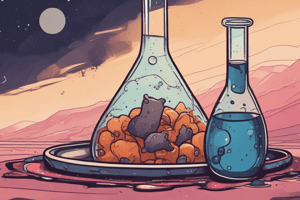Podcast
Questions and Answers
What is the definition of a mole?
What is the definition of a mole?
- The amount of substance that contains as many particles as there are atoms in 0.012 kilograms of carbon-12. (correct)
- The amount of substance that contains as many particles as there are electrons in 0.012 kilograms of carbon-12.
- The amount of substance that contains as many particles as there are atoms in 1 kilogram of carbon-12.
- The amount of substance that contains as many particles as there are molecules in 0.012 kilograms of carbon-12.
What is the value of Avogadro's Number?
What is the value of Avogadro's Number?
- 6.022 x 10^25 particles
- 6.022 x 10^20 particles
- 6.022 x 10^23 particles (correct)
- 6.022 x 10^21 particles
What is the unit of molar mass?
What is the unit of molar mass?
- milligrams per mole (mg/mol)
- moles per gram (mol/g)
- grams per mole (g/mol) (correct)
- kilograms per mole (kg/mol)
What is the conversion factor for mole to particle conversion?
What is the conversion factor for mole to particle conversion?
What is the importance of the mole concept in chemistry?
What is the importance of the mole concept in chemistry?
What is the volume of one mole of a gas at standard temperature and pressure (STP)?
What is the volume of one mole of a gas at standard temperature and pressure (STP)?
Flashcards are hidden until you start studying
Study Notes
Mole Concept
Definition
- A mole (mol) is the SI unit of amount of substance.
- It is defined as the amount of substance that contains as many particles (atoms, molecules, ions, or electrons) as there are atoms in 0.012 kilograms of carbon-12.
Key Concepts
- Avogadro's Number: 6.022 x 10^23 particles (atoms or molecules)
- Molar Mass: the mass of one mole of a substance, expressed in grams per mole (g/mol)
Mole Calculations
- Mole to Particle Conversion:
- 1 mole = 6.022 x 10^23 particles
- number of particles = number of moles x Avogadro's Number
- Mole to Mass Conversion:
- mass = number of moles x molar mass
- number of moles = mass / molar mass
- Mole to Volume Conversion (Gases):
- volume = number of moles x molar volume (22.4 L/mol at STP)
Importance of Mole Concept
- Allows for accurate calculations of quantities in chemical reactions
- Enables conversion between amount of substance and mass or volume
- Fundamental concept in chemistry, physics, and biochemistry
Mole Concept
Definition
- The mole (mol) is the SI unit of amount of substance.
- It is defined as the amount of substance containing as many particles (atoms, molecules, ions, or electrons) as there are atoms in 0.012 kilograms of carbon-12.
Key Concepts
- Avogadro's Number is 6.022 x 10^23 particles (atoms or molecules).
- Molar Mass is the mass of one mole of a substance, expressed in grams per mole (g/mol).
Mole Calculations
- 1 mole is equal to 6.022 x 10^23 particles.
- Number of particles can be calculated by multiplying the number of moles by Avogadro's Number.
- Mass can be calculated by multiplying the number of moles by molar mass.
- Number of moles can be calculated by dividing mass by molar mass.
- Volume of a gas can be calculated by multiplying the number of moles by molar volume (22.4 L/mol at STP).
Importance of Mole Concept
- The mole concept allows for accurate calculations of quantities in chemical reactions.
- It enables conversion between amount of substance and mass or volume.
- The mole concept is a fundamental concept in chemistry, physics, and biochemistry.
Studying That Suits You
Use AI to generate personalized quizzes and flashcards to suit your learning preferences.




